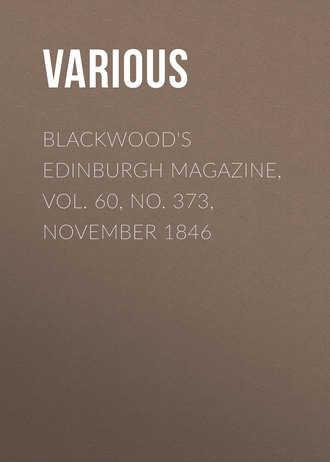
Various
Blackwood's Edinburgh Magazine, Vol. 60, No. 373, November 1846
It has sometimes occurred to me, in scrutinising his later movements, that one of his set purposes was finally to break up the Conservative party, and scatter among it the seeds of future dissension and difficulty; possibly thinking, conscientiously, that in the state of things which he had brought about, the continued existence of a Conservative party with definite points of cohesion, with visible acknowledged rallying-points, could no longer be beneficial to the country. He may have in his eye the formation of another party, willing to accept of his leadership, after another general election; of which said new party his present few adherents are to form the nucleus. But I do not see how this is to be done. Confounding, for a time, to all party connexions and combinations as have been the occurrences of the last session, of perhaps the last two sessions, of Parliament, a steady watchful eye may already see the two great parties of the state – Liberal and Conservatives – readjusting themselves in conformity with their respective general views and principles. The Conservative party has at the moment a prodigious strength of hold upon the country – not noisy or ostentatious, but real, and calculated to have its strength rapidly, though secretly, increased by alarmed seceders from the Liberal ranks, on seeing the spirit of change become more bold and active, and directing its steps towards the regions of revolution and democracy. Sir Robert Peel's speech, on resigning office, presented several features of an alarming character. Several of his sentences, especially with reference to Ireland,
– "made the boldest hold their breath
For a time."
Candid persons did not see in what he was doing, the paltry desire to outbid his perplexed successors, but suspected that he was designedly – advisedly – laying down visible lines of eternal separation between him and his former supporters, rendering it impossible for him to return to them, or for them to go over to him; and so at once putting an extinguisher upon all future doubts and speculation. To me it appeared that the speech in question evidenced an astounding revolution – astounding in its suddenness and violence – of the speaker's political system; announcing results, while other men were only just beginning to see the process. Will Sir Robert Peel join Lord John Russell? What, serve under him, and become a fellow-subordinate of Lord Palmerston's? I think not. What post would be offered to him? What post would he, the late prime minister, consent to fill under his victorious rival? Will, then, Lord John Russell act under Sir Robert Peel? Most certainly – at least in my opinion – not. What then is to be done, in the event of Sir Robert Peel's being willing to resume official life? Over whom, under whom, with whom, is he to act? The Conservative party have already elected his successor, Lord Stanley, who cannot, who will not be deposed in favour of any one; a man of very splendid talents, of long official experience, of lofty personal character, of paramount hereditary claims to the support of the aristocracy, who has never sacrificed consistency, but rather sacrificed every thing for consistency. Ever since he accepted the leadership of the great Conservative party, he has evinced a profound sense of its responsibilities and requirements, and the possession of these qualifications in respect of prudence and moderation, which some had formerly doubted. Lord Stanley, then, will continue the Conservative leader, and Lord John Russell the Liberal leader; and I doubt whether any decisive move will be made till after the ensuing general election. What will be the result of it? What will be the rallying-cries of party? What will Sir Robert Peel say to the Tamworth electors?
However these questions may be answered, I would, had I the power, speak trumpet-tongued to our Conservative friends in every county and borough in the kingdom, and say, "up, and be doing." Spare no expense or exertion, but do it prudently. Use every instrument of legitimate influence – for the stake played for is tremendous; the national interests evidently marked out for assault, are vital; and they will stand or fall, and we enjoy peace, or be condemned to agitation and alarm, according to the result of the next General Election, which will assuredly palsy the hands of either the friends or enemies of the best interests of the country.
And now, dear Christopher, I draw towards the close of this long letter, without having been able even to touch upon several other "Things" which I had noted down for observation and comment. As my letter draws to a close, so also draws rapidly to a close my seaside sojourn. My hours of relaxation are numbered. I must return to the busy scenes of the metropolis, and resume my interrupted duties. And you, too, have returned to the scene of your renown, the sphere of your honourable and responsible duties. May your shadow never grow less! Floreat Maga! I have done. The old postman, wet through in coming over the hills, is waiting for my letter, and, having finished his beer, is fidgeting to be off. "What! can't you spare me one five minutes more?" "No, sir – impossible – I ought to have been at – an hour ago"
Farewell then, dear Christopher,Your faithful friend,An Old Contributor.


